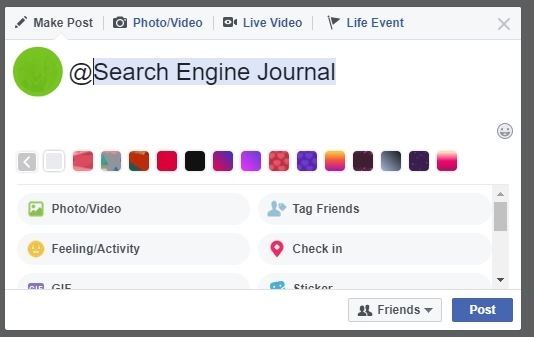People are constantly bombarded with messages from several channels on a daily basis, via Facebook, TikTok, Instagram, email, texts, online ads, and much more.
It can be quite the challenge to grab someone’s attention and keep it, even briefly, in this day and age.
Creating a message that captivates people is critical. The most crucial factor when it comes to creating engaging Facebook videos is exactly that: engage the user. And you have just seconds to do it.
Here are a few methods that can result in greater overall engagement for your Facebook videos.
1. Don’t Waste Time at the Beginning
When it comes to creating Facebook videos (and videos, in general) you don’t want to create a long, drawn-out introduction that steadily builds up to some masterful climax that shocks and awes a visitor.
Your video should cut to the chase.
You must be able to accomplish this using only compelling visuals – not video coupled with sound.
A couple of ideas to help you do this:
- Use powerful thumbnail images.
- Add a nice teaser sentence hinting at what the video is about, providing an informative synopsis.
2. Take Advantage of Captions
There is no definitive proof on how many users watch videos on Facebook with the sound on (though this number is estimated to be 85%), although Facebook now autoplays videos on mobile with sound.
The setting can be disabled, and videos can play with no sound on mobile if a user’s phone is in silent mode.
Captions can help users understand your video, even if there is no audio. One study found that CTA clicks fell by approximately 26% when captions were not used.
Utilizing captions helps to decrease the chance of losing the user if they can’t understand the video without sound.
3. Choose a Name Wisely
Make sure your video has a descriptive, captivating title so that it can be easily searched by users.
Just like optimizing individual webpages (your title tags and meta descriptions), your Facebook video should include an apt title with targeted keywords to increase its visibility. This also leaves little room for confusion for users.
4. Give Users a Taste of the Content
Use your Facebook post copy to describe the content of your video. This will help convince users to commit to watching the video.
Taking the time to stop and view a video online can seem like a large time commitment for some.
By providing Facebook users with a brief synopsis of what the content is about, you can help to increase the chances that the video may spark their interest and that they will want to watch it.
An informative sentence and a fitting thumbnail can easily achieve this.

5. Add a Call-to-Action
Adding a call-to-action (CTA) provides Facebook users with clear direction on what you want them to do. It is as if the user has a straightforward guide.
CTAs can encourage higher click-through rates (CTRs), conversions, and more.
The ideal places to put a CTA:
- Inside of the post copy.
- Throughout the video itself.
- At the end of the video with a text overlay.
6. Shape Matters
When formatting your Facebook videos, pay close attention to whether you utilize a square video or a landscape video.
Square videos receive higher amounts of engagement, views, and reach – particularly on mobile.
This makes sense, as the majority of Facebook users use their mobile devices and square videos take up the majority of real estate on the mobile News Feed.
7. Keep It Simple, Stupid (KISS)
This classic point can be applied to many things, including encouraging engagement with your Facebook videos.
Don’t try to throw too much at users at once with a Facebook video. Facebook video viewers are usually not looking for a complex video essay, but rather easily digestible and shareable content.
If you want to increase the likelihood of a video being consumed and then shared, it needs to emphasize one simple, easy-to-understand point.
Making your content easy to digest and understand will increase the chances that users will actually share your videos.
8. Tag Others (When It’s Relevant)
If other people or businesses/brands helped with (or appear in or are mentioned in) your Facebook video, or if you think that others would be interested in seeing it, then it could be a good idea to tag them.
Just make sure to keep tagging relevant and on topic.
Tagging is easy.
Type the “@” symbol before the person or title of the page that you wish to tag.

9. Use Insights to Their Fullest Potential
Facebook provides insights such as average watch time, total minutes watched, etc.
This can provide valuable intel into which videos users find the most engaging, as well as help in planning out future social video strategies.
10. Post Directly to Facebook
Adding videos directly to Facebook helps them to rank in a more prominent position in the News Feed.
If you have a YouTube video that you would also like to share on Facebook, avoid copying and pasting the YouTube link and instead post the video again directly to Facebook.
11. Tailor Copy Specific to Facebook
You probably have a presence on multiple social media platforms.
But it’s a smart idea to create individual copy tailored specifically for Facebook.
This way, it is easier to avoid sounding automated and generic across channels and it also allows you to play to each channel’s strengths.
For example, with Facebook, there is a much longer character limit (63,206) per post. When necessary, you can use this to deliver longer messages that will likely get more engagement.
Comments also have a character limit of 8,000, which invites users to write more drawn-out messages on individual posts.
12. Consider Going Live
Facebook’s algorithm has been updated in order to favor live videos as data has shown that live videos typically hold a user’s interest for a longer period of time.
Live videos have also been known to cause a bump in users exploring that page’s content (even if it isn’t the live video itself).
The hypothesis is that brands who get in front of their audience in this very direct way can help increase their level of relatability and trust.
In addition, Facebook will record the live video and publish it directly to a page once the recording session has come to an end.
13. Use the Right Video Formats
Ideally, the most optimal video format for Facebook is MP4. Facebook supports a variety of formats, but they specifically recommend either MP4 or MOV formats.
MP4 tends to also be the best format for Facebook video ads.
14. Use Facebook Stories and Ad Stories
Similar to Instagram stories, these are 15-second videos that will display between stories and disappear in 24 hours if they are organic Facebook stories.
However, Facebook Stories ads are also 15-seconds but do not disappear within a day.
These can be very engaging video formats. They appear right at the top of the app and users are more likely to view them as soon as they enter the app.
Approximately 62% of people have said that they have a greater interest in a product or brand after viewing a Facebook story.

15. Facebook 360 Videos
These videos are created with cameras that will record 360 degrees of a particular scene. This allows a user to watch from any angle you want, by moving your finger around the video as it plays.
These videos can be seen in a news feed and can be either Monoscopic (viewed from a single eye perspective) or Stereoscopic (viewed from the left and right eye perspective).
360 videos allow brands to showcase their human and relatable elements by recording workspace, events, etc.
Conclusion
In a world where you have less than 3 seconds to grab a user’s attention, it’s important to spend some time strategizing on the best ways to do so.
Facebook is an incredibly powerful outlet. Use your Facebook videos strategically to take full advantage.
More Facebook Video Marketing Resources:
- How To Premiere A Video On Facebook Live
- Can Social Live Video Help SEO? Yes, Here’s How
- Facebook’s Best Practices For Increasing Video Reach
- Video SEO for Universal Search: Tips, Tools & Techniques to Get Found
Image Credits
Screenshots taken by author, August 2021





